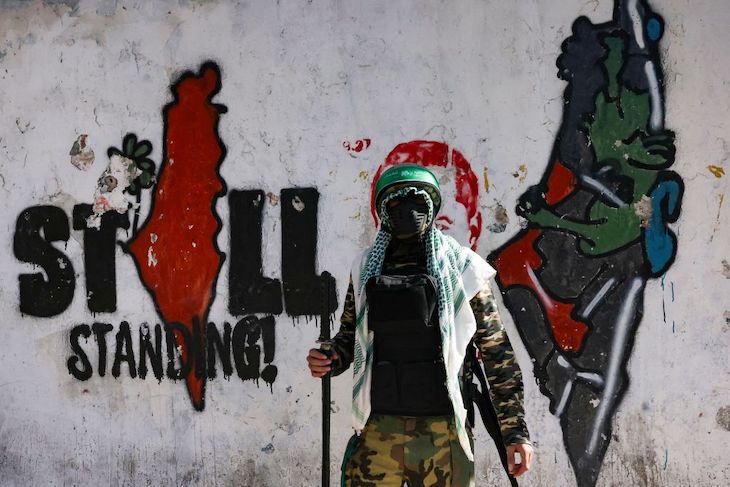The Guardian has found a new minority it wants to shield from offence. A new oppressed group it might shed some virtuous tears over. A put-upon section of society that urgently requires the warm, loving hug of Guardianista pity. And you won’t believe who it is. It’s the mad militants who invaded Israel on 7 October last year.
I probably shouldn’t call Hamas gunmen ‘mad’ – the Guardian might accuse me of ‘demonising’ them. In possibly the most crackpot piece it has published this year – and that’s saying something – the Guardian has slammed a new documentary about the 7 October attacks for ‘demonis[ing] Gazans as either killers or looters’. That the Gazans who crossed into Israel were killers and looters is immaterial, apparently.
It’s possibly the most crackpot piece the paper has published this year – and that’s saying something
It is written by Stuart Jeffries. It’s a review of One Day in October, a hard-hitting film in which survivors of Hamas’s rampage tell us what they saw. Jeffries admits it’s a tough, moving watch that captures the ‘bloodthirsty’ nature of Hamas’s attack. But then he goes off the rails. It’s too reductive towards Hamas, he suggests, lazily depicting them as a ‘generalised menace’. Fancy portraying a tooled-up army of anti-Semites as a menace.
‘If you want to understand why Hamas murdered civilians… One Day in October won’t help’, Jeffries writes. One envisions Guardian scribes scratching their chins as they try to figure out why a terrorist group founded to kill Jews killed Jews. Next they’ll be wondering why the KKK lynched black people. It’s all so perplexing.
The film ‘does a good job of demonising Gazans’, Jeffries blubs, ‘first as testosterone-crazed Hamas killers, later as shameless civilian looters, asset-stripping the kibbutz while bodies lay in the street’. Does Jeffries know this is a documentary? Meaning it documents things that actually happened? There were testosterone-crazed Hamas killers. Kibbutzim were looted. Is truth bigotry now?
Jeffries concedes the ‘evident evil’ of what Hamas did, but he nonetheless frets over the film’s possibly racist undertones. He is reminded of Zulu, the infamous Michael Caine movie, in which ‘nameless hordes of African warriors [are] pitted against British protagonists with whom we are encouraged to identify’. One Day in October does similar, he says – it ‘others’ one side in the events of 7 October.
I should think so too! I’m sorry, but if we cannot even ‘other’ racists with guns who raped women and murdered children, then we are lost. Truly lost. Imagine how knee-deep in the weeds of moral relativism you would need to be to haughtily tut-tut over the ‘othering’ of terrorists who phoned home to boast to their parents about how many Jews they had killed.
‘Othering’ Gazans as a whole is obviously not on. Branding all Arabs as ‘testosterone-crazed killers’ would clearly be racist. But the men who raped, pillaged and slaughtered their way through southern Israel on 7 October 2023? Yeah, they are ‘the other’. I am happy to call them enemies of civilisation. Sorry if that is a tad too judgemental for Guardian tastes.
Then comes Jeffries’ craziest cry. The problem with this film, he says, is that it goads us into giving ‘all our sympathies’ to ‘relatable Israelis’ and none to Hamas. So the Israelis we see include ‘a girl sending cute pictures of her playing with friends to her mum, who is cowering in a toilet cubicle, hoping the terrorists she can hear breathing outside can’t hear her’. Meanwhile, ‘Hamas terrorists’ – poor Hamas terrorists – are shown as a ‘generalised menace on CCTV, their motives beyond [the film’s] remit’.
This is where bleeding-heart liberalism crosses over into amoral lunacy. I can’t believe I have to explain to a well-educated man of letters that, yes, your sympathies should lie with the girl texting her mum who’s hiding in a toilet to avoid being murdered on account of Jewishness. Have we abandoned morality so completely that we now struggle to say that the mass-murdering terrorist is ‘bad’ and the mum trying to survive for the sake of the daughter she adores is ‘good’? God help us.
Look, I like nuance. I welcome complexity. Things are rarely black and white. But 7 October – that was black and white. There were no shades of grey in those kibbutzim stained red with blood. One side was evil, the other decent. The End.
How long before we find ourselves accused of ‘Hamasphobia’ if we criticise those murderous loons too harshly? I don’t want to single out Jeffries. I’m sure his heart is in the right place. But his bonkers piece – which has now been taken down – speaks to a moral chaos at large in a chattering class that has swapped critical thinking for a non-judgementalism that sometimes borders on nihilism. I’m just going to say it, brace yourselves: Hamas are the bad guys.
Brendan O’Neill’s new book, After the Pogrom: 7 October, Israel and the Crisis of Civilisation, is out now








Comments